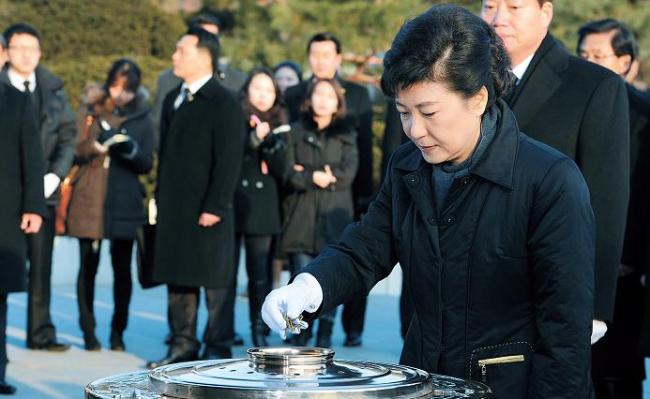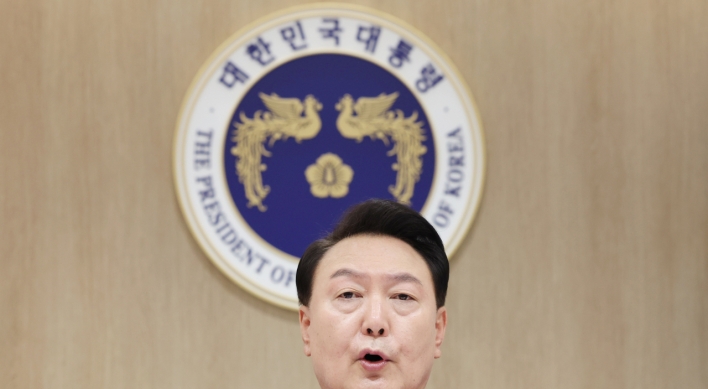Transition panel to shape next government
Bipartisan figures mentioned as prospective chief of transition team
By Korea HeraldPublished : Dec. 20, 2012 - 20:13
The administration and the ruling Saenuri Party launched the power transition process Thursday, the day after former party leader Park Geun-hye was elected the next president.
President Lee Myung-bak instructed his aides to ensure a seamless handover of authority to his successor, who will be inaugurated on Feb. 25.
“The president ordered the government to actively cooperate to ensure the next government’s success by providing accurate information, especially in economy and security,” presidential spokesman Park Jeong-ha told reporters after Lee’s regular meeting with senior secretaries.
President Lee Myung-bak instructed his aides to ensure a seamless handover of authority to his successor, who will be inaugurated on Feb. 25.
“The president ordered the government to actively cooperate to ensure the next government’s success by providing accurate information, especially in economy and security,” presidential spokesman Park Jeong-ha told reporters after Lee’s regular meeting with senior secretaries.

Lee may meet the president-elect next week, he added.
Officials from the Ministry of Public Administration and Security and the ruling party held a meeting to coordinate the transition process.
Other government branches began preparations for a policy briefing for the incoming president.
Park is expected to name her transition team within a week. The committee is expected to be headed by a figure who symbolizes her key agenda points of bipartisanship, national unity and a stable reform.
A number of widely respected centrist figures including Song Ho-keun, Seoul National University sociology professor; Jin Nyum, former finance minister; and Park Sang-jeung, former co-head of the People’s Solidarity for Participatory Democracy, are being mentioned as potential candidates to head the panel.
Also included on the lists are key members of her campaign including Kim Chong-in, head of the Committee to Pursue People’s Happiness, who led Park’s economic democratization plans, and Ahn Dai-hee, head of her Political Reform Committee, who mapped out her political reform programs.
The presidential transition committee has no decision-making power but plays a key role in shaping the direction of the administration for the next five years.
Based on a special law enacted in 2003, the committee prepares for the presidential inauguration ceremony and develops key policies.
The committee consists of a chairperson, vice chairperson and up to 24 other members ― all honorary posts directly appointed by Park. The body usually kicks off the week after the election and must terminate its term within 30 days of the incoming president’s inauguration.
It may request government departments to temporarily dispatch designated members as technical advisors or clerical employees, or demand any necessary data or briefing on pending issues.
A special budget will be allocated to the committee, though Park may not receive a government salary until taking office on Feb. 25.
The detailed working-level operations, such as selecting the location of the office or providing the necessary appliances, are generally handled by the Ministry of Public Administration and Security.
The location of the committee headquarters, though not yet confirmed, is likely to be in northern Seoul, near the presidential house, according to officials.
One of the plausible options is the eighth floor of the government complex building in Gwanghwamun, which has recently had space open up since several departments moved to the new administrative region of Sejong City.
In 2007, the transition committee for then-president-elect Lee Myung-bak settled in the Korea Banking Institute building in Samcheong-dong, central Seoul.
Considering the critical significance of this two-month power-transfer period, it is conventional for the leading candidate to put together one’s transition committee in advance.
In this year’s election, however, the contestants remained extremely discreet over their plans up to the last minute, lest any small sign of haughtiness trip them in the intense two-way race.
“In order to avoid possible feuds and setbacks, the president-elect should confirm the transition committee chief within three days from election victory,” said Hahm Sung-deuk, professor of public administration at Korea University.
Park’s aides nevertheless expressed concerns that a hasty move may trigger a backlash from the opposition while electioneering aftereffects remain.
“It is better to place the president-elect in the spotlight and take more caution over the transition committee,” said an official of Park’s election headquarters.
By Bae Hyun-jung (tellme@heraldcorp.com)
-
Articles by Korea Herald




















